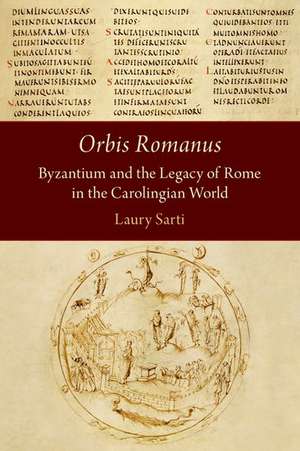Orbis Romanus: Byzantium and the Legacy of Rome in the Carolingian World
Autor Laury Sartien Limba Engleză Hardback – 29 aug 2024
Preț: 711.31 lei
Preț vechi: 878.17 lei
-19% Nou
Puncte Express: 1067
Preț estimativ în valută:
136.11€ • 142.47$ • 113.29£
136.11€ • 142.47$ • 113.29£
Carte disponibilă
Livrare economică 10-24 martie
Preluare comenzi: 021 569.72.76
Specificații
ISBN-13: 9780197746523
ISBN-10: 0197746527
Pagini: 424
Ilustrații: 38 b/w illustrations, 2 maps
Dimensiuni: 155 x 226 x 33 mm
Greutate: 0.75 kg
Editura: Oxford University Press
Colecția OUP USA
Locul publicării:New York, United States
ISBN-10: 0197746527
Pagini: 424
Ilustrații: 38 b/w illustrations, 2 maps
Dimensiuni: 155 x 226 x 33 mm
Greutate: 0.75 kg
Editura: Oxford University Press
Colecția OUP USA
Locul publicării:New York, United States
Recenzii
Laury Sarti's fascinating new book forces us to reassess the attitudes of both Franks and Byzantines to the Roman past-and the Roman present-in the Carolingian period. We gain a greater understanding of what Rome meant to them, and how this fitted with the nature and meaning of the complex network of relations between the two political systems across the ninth century.
Notă biografică
Laury Sarti is Senior Lecturer in Medieval History at the University of Freiburg, with research focusing on military history, Mediterranean connectivity, and physical mobility. She is the author of Westeuropa zwischen Antike und Mittelalter and Perceiving War and the Military in Early Christian Gaul (400-700).
